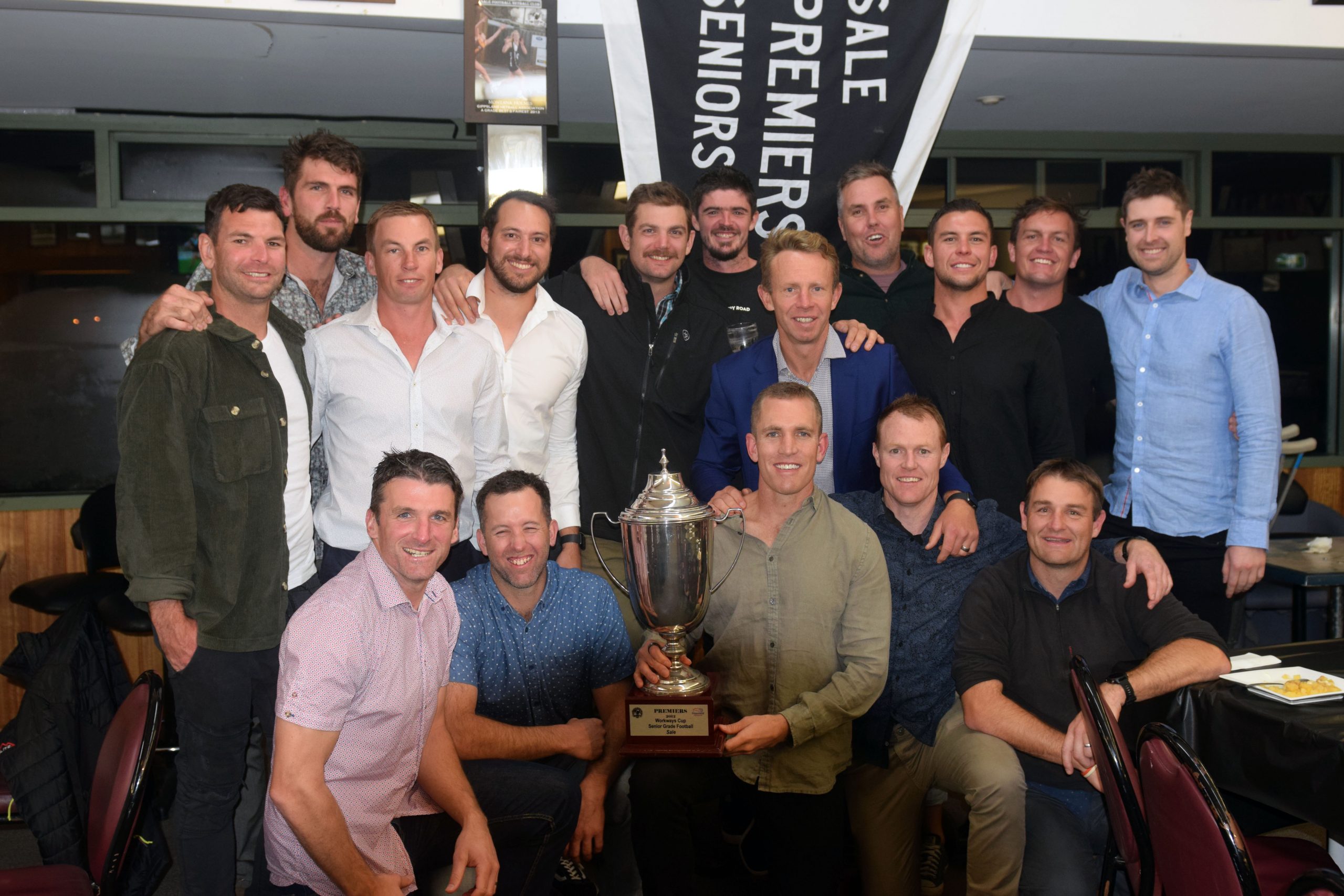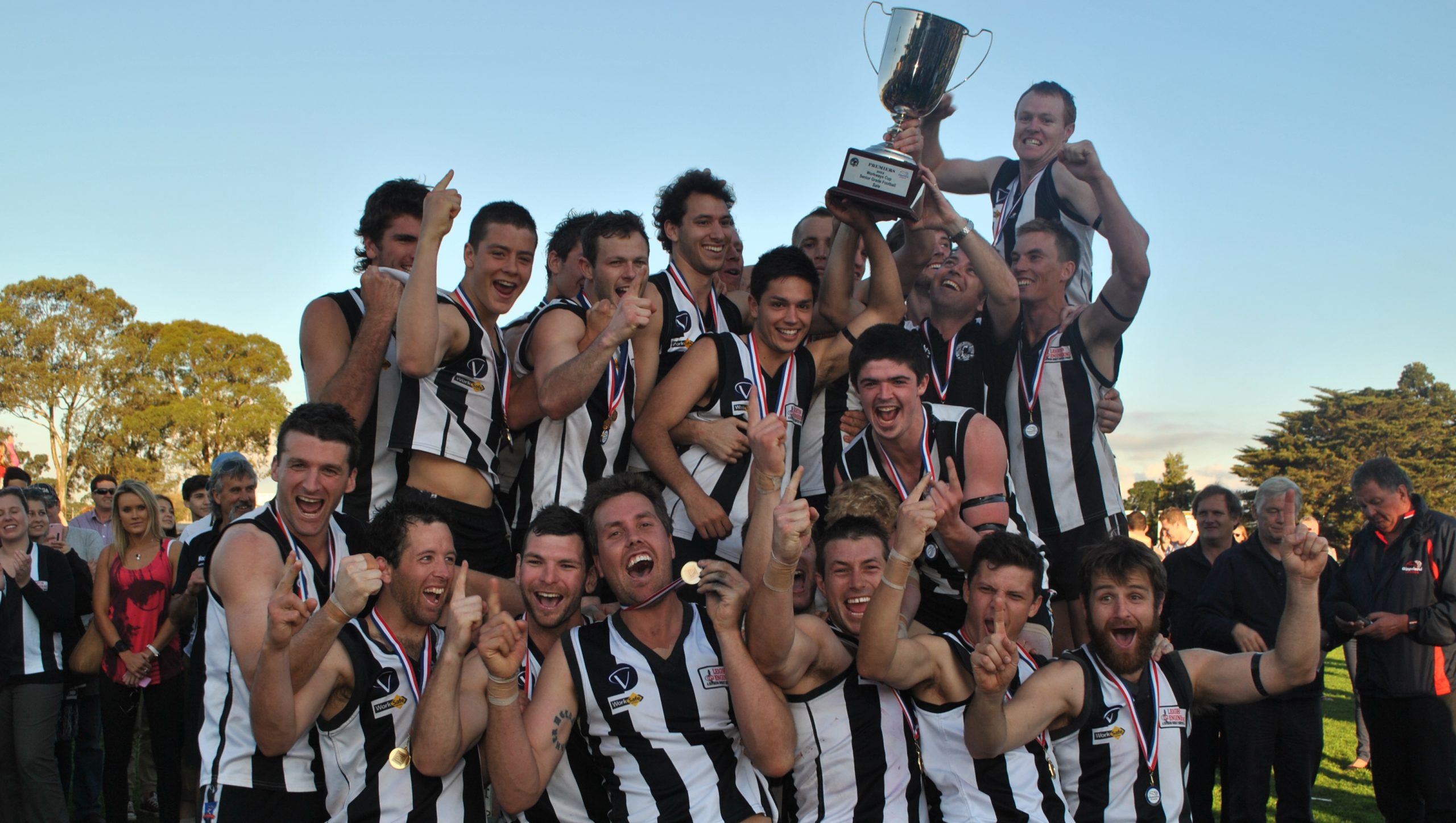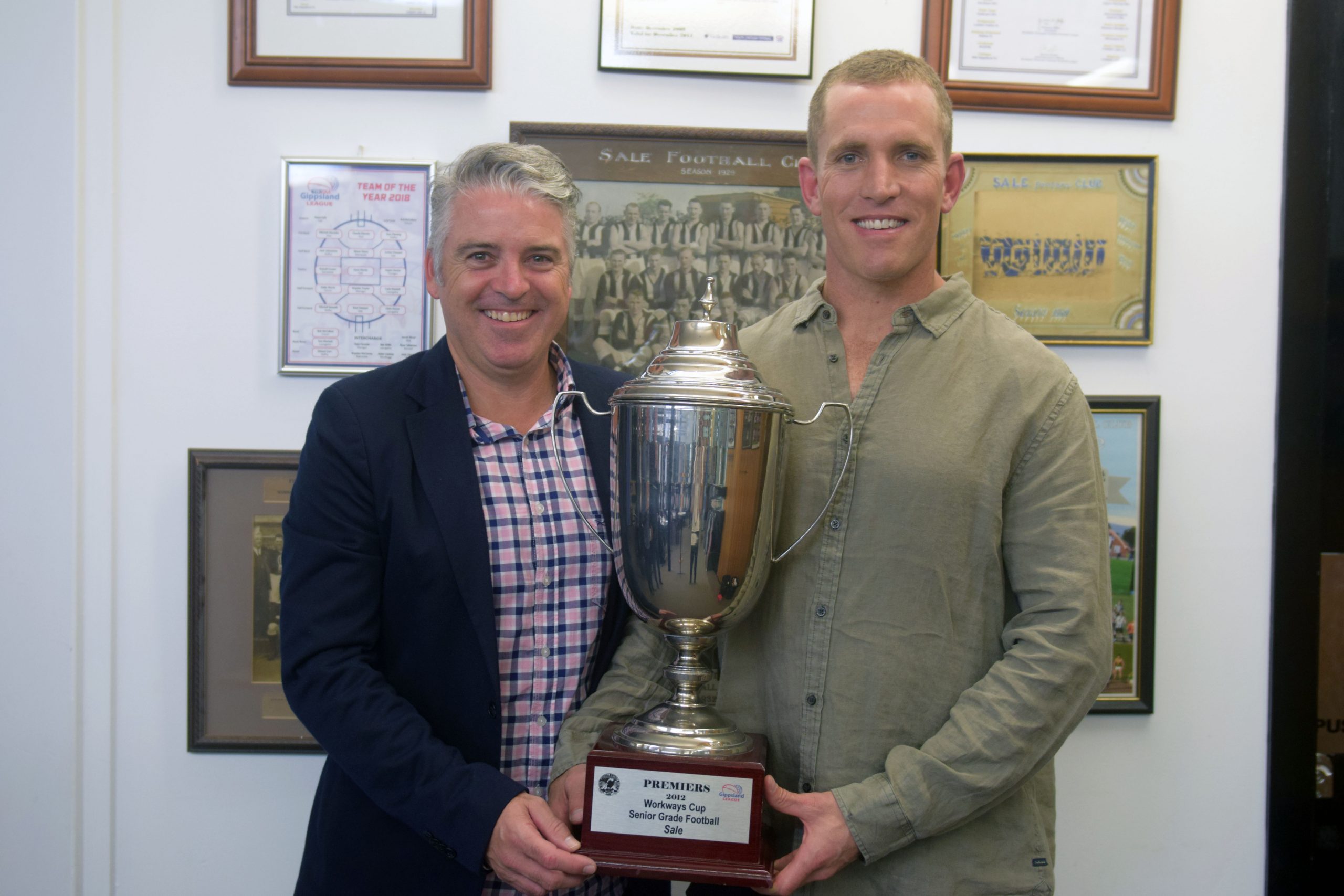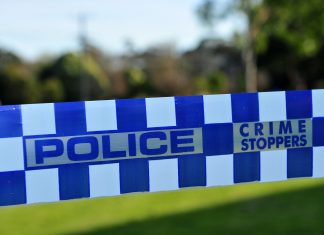
LIAM DURKIN
Liam Durkin
SALE Football-Netball Club celebrated the 10-year reunion of their 2012 senior premiership last Saturday.
Players and officials gathered at Sale Oval to reminisce, recall and remember deeds performed during what was one of the most dominant seasons by an individual team in Gippsland League history.
The Magpies put together a truly spell-bounding campaign in 2012, virtually wiping out every opponent it came up against.
Sale’s 2012 title was the club’s 10th since the Gippsland League was established in 1954, and remains their most recent.
Those in attendance last Saturday heard from playing-coach Matt Ferguson, while the
premiership cup was taken out of the trophy cabinet and players were seated amid the backdrop of the 2012 premiership flag.
Ferguson, a former Sale junior who played 12 games for St Kilda, took on the coaching job in 2012.
Little was he or anyone to know what that year had in store.
FOUNDATION FOR A FLAG
AFTER winning the Gippsland League premiership in 2008, the Magpies suffered a mass exodus of players, losing half of its flag winning side, and duly finished the 2009 season in eighth position.
The next year was spent developing under coach Nick Anderson, who took over from premiership winning mentor Adrian Cox.
Sale finished seventh in 2010, but a solid recruiting drive the next season that enticed Ferguson and former Brisbane and Carlton player Dylan McLaren back to the club saw the Magpies end the home-and-away season in third.
However, disaster struck in the finals series, and Sale went out in straight sets.
Anderson departed following the loss, and Ferguson took over.
Ferguson, who played with Perth in the WAFL after his time at St Kilda ended, said coaching was never really on his radar.
“It was more situational,” he said.
“I guess I thought I had enough football knowledge and I had too many good ideas in my head at the time that I didn’t want to go to waste.
“The more I thought about it the more it built inside me. I talked to a few mates and they had my support, especially my good mate Justin McLay, he really encouraged me to do it, he said he’d come back from Sale City to come across and play, once I really applied myself the boys seemed to resonate with me.”
Despite failing to win a final in 2011, Ferguson said there was enough to suggest the team was tracking in the right direction.
“I knew we had a good list, we were able to recruit a few players and we knew that if I could get the boys really enjoying their footy we could push for a premiership,” he said.
With the players assembled, Sale had the basis of a successful team – then it unleashed something that had never been seen before.
PRESSURE COOKER
OF all the brilliant ideas Ferguson had in his head, one proved to be the most devastating for opposition teams.
Breaking from the norm, Sale decided to go with a system that had never been used in the Gippsland League before: a full ground press.
The press initially caught every other team off guard, as Sale rolled over its opponents with a high octane style that created incredible levels of pressure.
Onlookers were left stunned and amazed at its effectiveness and by the second half of the season, bedazzled opposition coaches were scratching their head to try and conjure up a way to counteract it.
In the end, not only could teams not beat Sale, they couldn’t stop them.
As Ferguson explained, the press worked on the simple principle that chaos created panic for opposition defenders.
“The theory behind it all was you had to have forward pressure, you had to have fit players in your forward line willing to chase, tackle and harass,” he said.
“It was about defenders coming off their man to push up the ground and come forward to defend, it was about celebrating not just goals and nice kicks but it was about celebrating surging the ball out of bounds, gaining territory, punching from behind, all those one per cent things.
“We got so good at that, when we would punch the ball out of bounds we would celebrate and get around each other, the other team didn’t really understand what was going on, we knew exactly where we wanted the ball, we were forcing the other team backwards, sidewards, down the line, if they kicked it in the middle it was turnover city, teams just had nowhere to go.”
So, where did the idea come from and why was it so effective?
“I played four years under Grant Thomas at St Kilda, and then two years under Ross Lyon,” Ferguson said.
“He (Lyon) didn’t really perfect the forward press until 2009 which was the year after I got delisted, but I could see what was happening and I was very interested in learning what was happening.
“I still had some really good contacts at the footy club, I was able to get some inside knowledge of how to teach it. I got a memory stick from someone at the club which was a real game-changer.
“The technology wasn’t great back then but it showed some cartoons of rolling zones and some key points. I dumbed it down quite a bit because we didn’t have the time to train the boys but I tried to just give them the key points and key teachings.”
For Sale, it seems 2012 wasn’t so much about how to beat an opposition, but more on making sure an opposition could never defeat them.
“We had continuity, the boys just had so much confidence in positioning,” Ferguson said.
“You would see teams arguing amongst themselves, coaches didn’t really know what to do.
“Maffra was a super high scoring team, they’d kicked 150 points the week before playing us and then kicked 20 or 30 points.
“For that year there was no answers.”
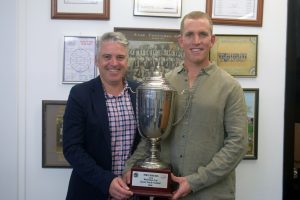
PATH OF DESTRUCTION
SALE officials may well have been forgiven for thinking their new coach would take some time to find his feet after what was an inauspicious start to the season.
The Magpies almost lost a practise game to neighbours Sale City, with Ferguson unsure at that stage whether or not local footy was ready for a full ground press.
Any such doubts were surely extinguished once the season proper came around.
After three games the Magpies were undefeated, with winning margins of 140, 113 and 95 points.
A Round 6 loss to Morwell by five points served as nothing more than a blip on the radar, as Sale went on to win every game for the remainder of the home-and-away season.
Along the way there was some absolute carnage for opponents.
The Magpies won their Round 10 match against Bairnsdale by 176 points – Alister Ford never coached the Redlegs again.
The Magpies kept Leongatha goalless in Round 18 – the Parrots finished the season second on the ladder.
Ferguson labelled the Leongatha job as the side’s most complete performance.
“It was just one of those years where we got that perfect mix,” he said.
“Maffra had it over us for so many years and didn’t get anywhere near us for the entire year, it was one of those years where we looked at each other in the eyes before we ran out and we almost knew what we were going to get and the results showed.
“The confidence was just super high.”
The statistics for Sale from 2012 were staggering to say the least.
The Magpies’ average winning margin sat close to 80 points, while all-in-all they kicked 212 more goals than their opponents.
They averaged 17 goals a game and won four games by over 100 points.
Although this all points to the season being a walk in the park, keep in mind Sale had to play with the pressure and expectation of winning every single week.
A KID NAMED DUNKLEY
BEFORE becoming a 100-gamer with the Western Bulldogs, a little know 15-year-old by the name of Josh Dunkley was playing senior football at Sale.
While most kids his age were kicking the dew off the ground at 9.30am, Ferguson saw enough in the youngster to play him in the main game.
Dunkley was brought into the side mid-season and never looked back, becoming the youngest ever Sale senior premiership player.
Amazingly, he was a bottom aged under 16 player at the time.
Ferguson remembers a young boy who well and truly belied his age.
“I can remember ringing up his dad (Sydney Swan Hall of Famer Andrew) and asking him if we could pick him,” Ferguson said.
“His dad said ‘I’m okay with it, I think he would love to play, give him a call and see what he says’.
“I called Josh Dunkley and he was rapt. He fronted up, it was an element of coaching that I didn’t expect or plan for that just blew me away, watching these young kids come through, especially Josh, he showed us all how to attack the ball, how to tackle, he was an incredible young kid.
“Once he became part of our team the opposition didn’t even notice he was so young. He was baby-faced but the way he played footy just showed so much leadership.
“He was as tough as they come, he did not take a backward step, and he was even quite aggressive. He had some really mature players around him, blokes like Collo (Luke Collins), Sweeney (Jamie Sweeney), Kane Martin, he was coming into a gun midfield so it was a perfect environment for him to just grow.”
Four years later Dunkley would be on another premiership dais, only this time in front of more than 100,000 people.
FINALS TIME
AFTER finishing on top of the ladder by two games and more than 100 per cent, Sale faced rival Maffra in the first semi-final.
The Magpies broke away from the Eagles after quarter time to eventually win by 38 points 13.6 (84) to 6.10 (46).
Maffra then won the preliminary final in a thriller, getting up over Leongatha by a point.
Even that tells a story of how dominant Sale was: Leongatha missed playing in the grand final by a point and the Magpies kept them goal less for an entire game.
With a local derby set to determine the season’s premier, the Magpies capped off their dominance by leading at every change to win by 56 points.
Among the best players in the black and white on grand final day were future club leaders Shane Fyfe and Jordan Dessent, as well as Ferguson who kicked five goals.
Martin was prolific, and collected both best-on-ground medals on offer.
Ferguson said the day was etched in his memory, with one particular moment standing out.
“When Dylan McLaren bombed a goal from the midfield in the third quarter that is when reality set in,” he said.
At that stage Sale had a sizeable lead, and the fourth quarter acted as little more than a formality as the Magpies won 17.7 (109) to 7.11 (53).
The premiership was Ferguson’s first, and in the immediate aftermath he described the beer as tasting like “liquid gold”.
Come the presentation, Ferguson, as captain and coach was left with no one to hold the cup up alongside with.
Club president Scott Pearce was rightly called on stage to take the honour.
“John Patten was president in 2008, he sticks it to me quite often because he had Adrian Cox as coach and Chris Laverty as captain, Ferg being captain-coach, somehow I got called up on stage, and the next minute they are presenting me the cup with Ferg,” Pearce said.
“I played in two grand finals, one with Sale and one in Queensland and lost them both so I was rapt, that photo is pride of place at home that’s for sure … very lucky. It was pure relief when we won.”
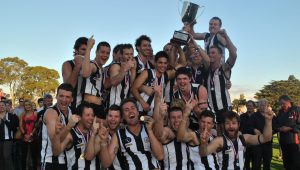
CELEBRATIONS IN THE SHED
FROM Morwell where the game was held, the Sale contingent made their way back into town.
The club hired a shed at the local Agricultural Society to hold its after party, and as Pearce recalls, it was a “very long night”.
A shed offered a practical location to host the vast number of Magpie players and supporters, which included those from the Sale reserves who had unfortunately lost their grand final in dramatic circumstances.
The senior team was presented on stage, and from there celebrations continued. It did not take long for the premiership cup to suffer from its instant popularity, and a visit to Gippsland Trophy House was needed to help piece it back together.
A LOST DYNASTY?
AS good as Sale was in 2012, the fact remains – they only ever won one flag.
For a team that was so dominant, it appeared a safe bet the Magpies would win at least another premiership in the years to come.
Sale made the grand final again in 2013, and the preliminary final in 2014, only to suffer crushing defeats on both occasions.
In 2013 the Magpies went into the grand final with 32 consecutive wins under their belt – and lost by 81 points.
The next year they were 45 points up at three quarter time in the preliminary final – and lost by two points.
Ferguson, who coached to the end of 2014, said it was a shattering way to bow out.
“For the amount of games we won, to only get one flag was definitely disappointing,” he said. “It is hard to stomach, I’m not going to say I don’t still think about it.
“We were really dominant, to only get one premiership still hurts but I guess we are here to celebrate the positives.
“I can’t tell you which one hurt more out of 2013 and 14′. I can remember after the 2014 one I struggled to even talk to the team after the game, to be up by 45 points at three quarter time and to lose by two points, that was my last game I coached, I have to live with that.”
While premierships are hard to win, there is an undeniable sense Sale missed a golden opportunity to go back-to-back or even complete a hat-trick, which would have put them among the truly great Gippsland League teams of all-time.
In looking at what went wrong, it may well have been the Magpies greatest strength became their greatest weakness.
“We actually didn’t know how to beat it (the full ground press),” Ferguson said.
“We knew how to do it, if we had to play against it we weren’t too sure, we just knew that we had a game plan that seemed unbeatable at the time.
“You need to keep continuing to learn and refine it, maybe in 2013 and 14′ we went away from the things that put us in that position.”
Although a dynasty eluded them, for what Sale put together in 2012, they certainly deserve to be mentioned in the same conversation as Morwell 1993, Traralgon 1998 and Maffra 2004.
Morwell was the only team to beat Sale in 2012.
They beat them again the next year too – but that story will have to wait until their reunion.






